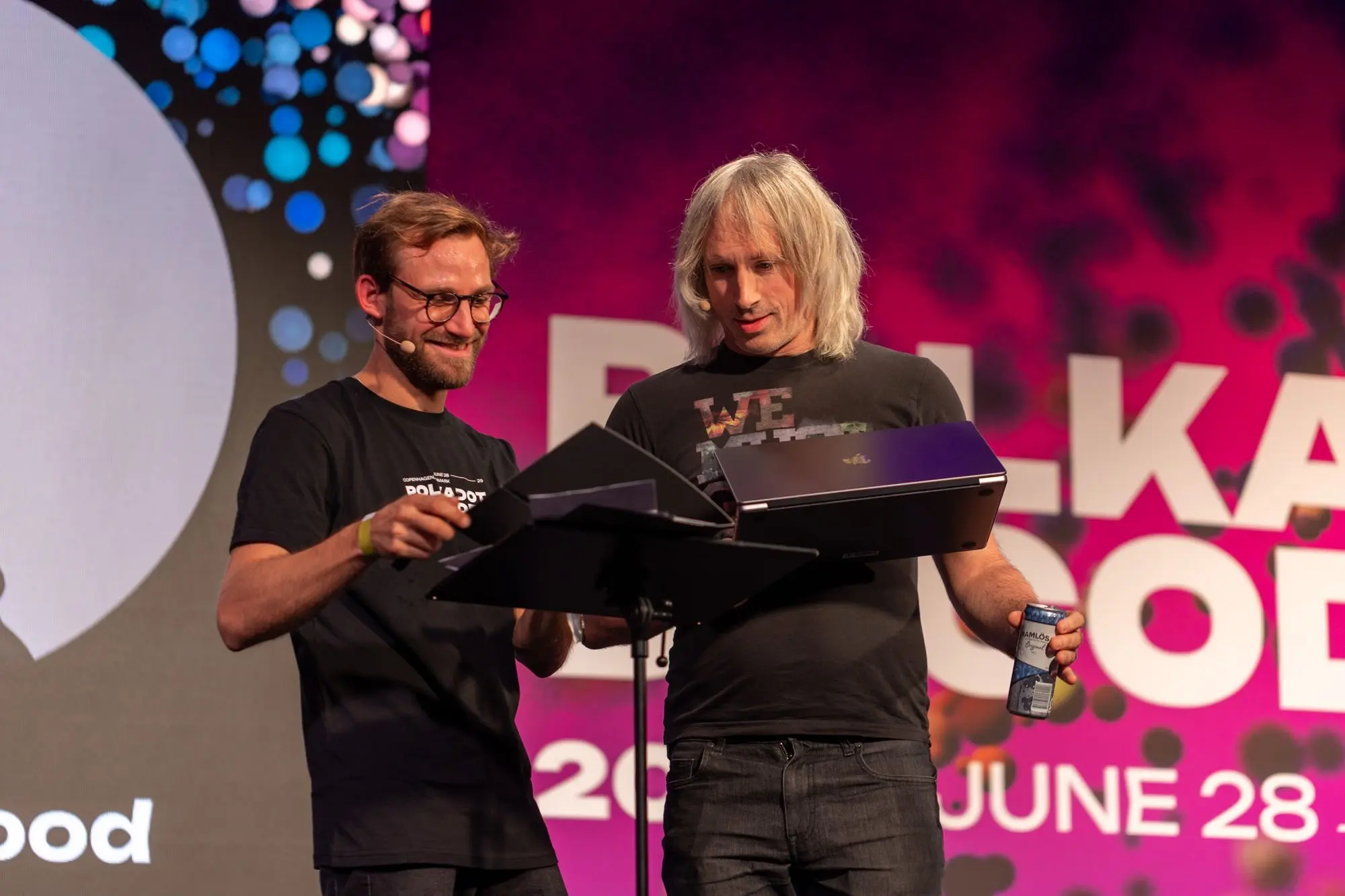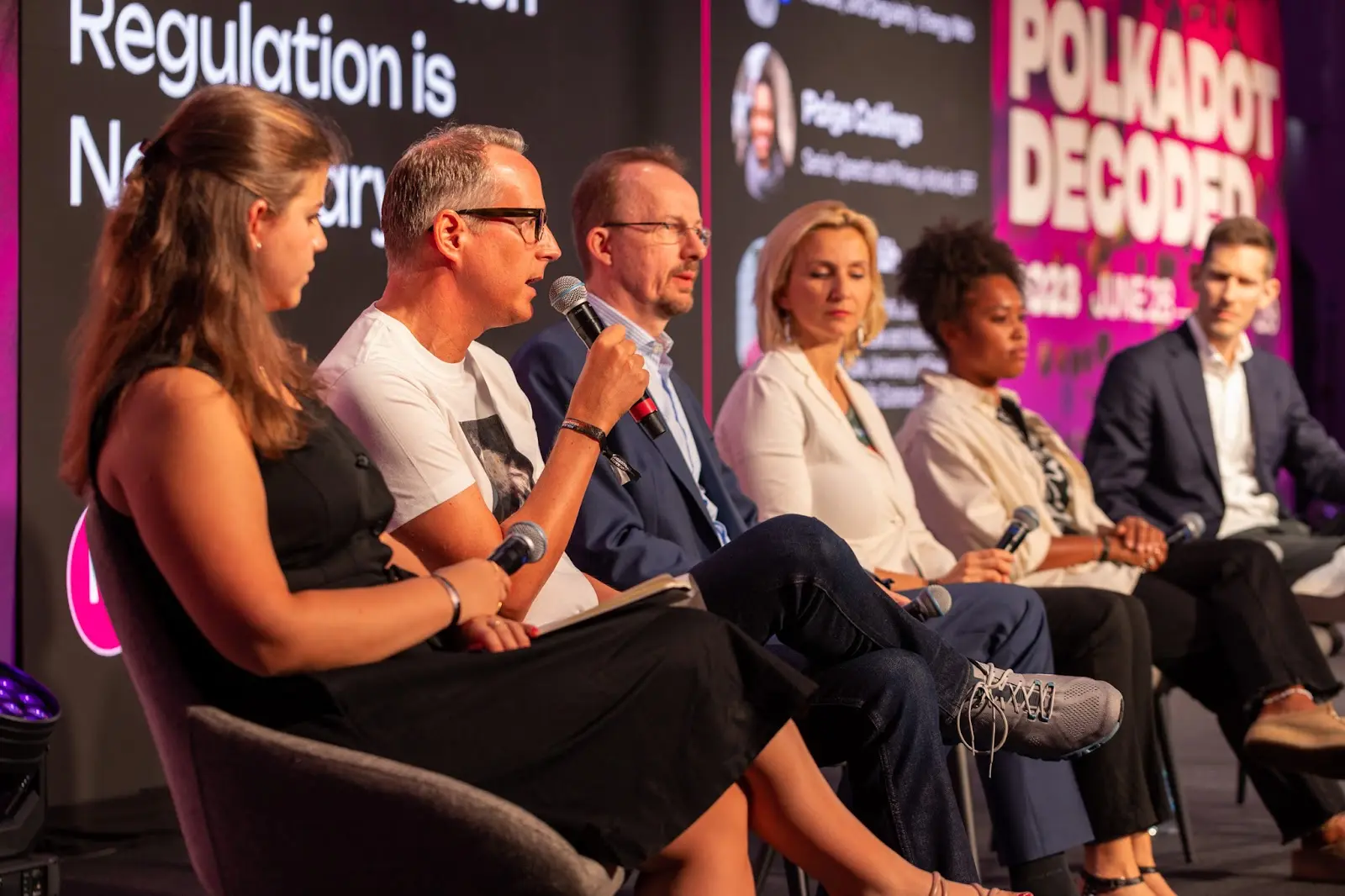Polkadot Decoded showcases boundless ecosystem innovation and visionary leadership
Day one of Polkadot Decoded 2023 heard exciting announcements and updates from parachains and dapps, to enterprises and regulatory experts.
Fourth edition of the flagship event opens to packed audiences in Copenhagen

A packed house on day one of Polkadot Decoded 2023 heard exciting announcements and updates from key voices both within and outside of the Polkadot ecosystem, from parachains and dapps, to enterprises and regulatory experts.
Thousands of people, representing Polkadot’s global community, watched online or inside Copenhagen’s buzzing Øksnehallen, to be treated to new insights from Polkadot founders, Dr Gavin Wood and Robert Habermeier. The day also featured major announcements across the ecosystem, including new NFT drops, critical environmental initiatives, and tokenized Teslas, among others.
The blockspace ecosystem for boundless innovation
Polkadot founder Rob Habermeier spoke about the importance of providing blockspace that is secure, composable, flexible, efficient and cost-effective. A single blockchain cannot scale to meet the needs of truly global activity while providing the diversity of value that developers, businesses, and consumers require. But a flexible blockspace ecosystem - in which blockspace is available on-demand or in bulk - is important for supporting projects at every stage of growth. When on-demand parachains are released on Polkadot later this year, it will be the only blockspace ecosystem to provide multiple allocation models.
Habermeier said much of the new focus around blockspace was about optimizing blockspace consumption. He said: “We're trying to generalize the offerings at the core level of Polkadot to hit different audiences. For a bootstrap start-up this would be simply as easy as ‘write code, deploy it and go’. You shouldn't be paying for blockspace you aren't using but you should be able to scale up and boost.”
Chief Architect illustrates the future of Polkadot
Dr Wood, also serving as Chief Architect of Parity Technologies, a leading contributor to the Polkadot network, took these ideas even further with a vision for the future of Polkadot. Envisioning Polkadot as a global, multi-core supercomputer, Wood offered ideas for Polkadot’s evolution to include additional, more flexible and capital-efficient ways to access its computing power. “Polkadot should be an integrated system, a single computer on which many applications run,” Wood said. This new direction would evolve Polkadot away from its current reliance on parachain slot auctions to offer more ways of connecting to the network, catering to a wider range of needs and serving different stages of a product’s growth cycle.
Wood also introduced the concept of ‘accords’, a potential model for creating opt-in ’treaty-like’ agreements between multiple blockchains in the network that would enable new functionality, such as decentralized exchanges that span multiple chains, offering an even more secure and seamless user experience.
Momentum throughout the community
The morning session was filled with a series of lively panels, featuring enterprise partners who are already helping bridge the gap between Polkadot’s technology and the wider world. These included a discussion on how much regulation is necessary in the world of Web3. Panelist Joachim Schwerin, Principal Economist for Digital Transformation at the European Commission, said there is an opportunity for small-scale, fully decentralized startups to prosper: "All the risk is in the centralized silos. Be assertive; work together. You are the good ones but you need to make your voice heard in the way the regulators understand."

The regulatory panel featuring Joachim Schwerin (third left)
These panels featured input from key figures at Beatport, Energy Web, MeWe, and the NFT music marketplace Public Pressure, which has already worked with the fashion label Diesel through Moonsama. Public Pressure then organized a social hour after the talks, with music selected by Cristina Lazic, a DJ with a growing international profile who released her first NFT during the set, available for free for all attendees.
Other major announcements included:
- A partnership between Sovereign Nature Initiative and the Moonsama was unveiled, bringing data about wild lions in Kenya into virtual realms, and benefiting real-world conservation efforts.
- The Substrate-built peaq announced it was bringing Teslas into the Polkadot ecosystem via the car-sharing start-up ELOOP.
- Evrloot, a well-known ecosystem team, revealed its new game Stardust Colonies would be built on the Ajuna Network parachain - demonstrating the growth of builder activity at the application layer.
The two-day event convenes builders, developers, and Web3 enthusiasts from across the Polkadot ecosystem. In all, more than 100 speakers are presenting across four stages over the two days, and many people are convening at one of 40 official viewing parties around the world.
Stream all the day two action from Copenhagen to see the talks live and get great announcements first hand. Register here for a ‘virtual’ ticket and download the Polkadot Events app for full details.
About Polkadot
Polkadot is the #1 blockspace ecosystem for boundless innovation. It enables Web3’s biggest innovators to get their ideas to market fast, with predictable costs and the industry's most flexible token options. By making blockchain technology secure, composable, flexible, efficient, and cost effective, Polkadot is powering the movement for a better web.












